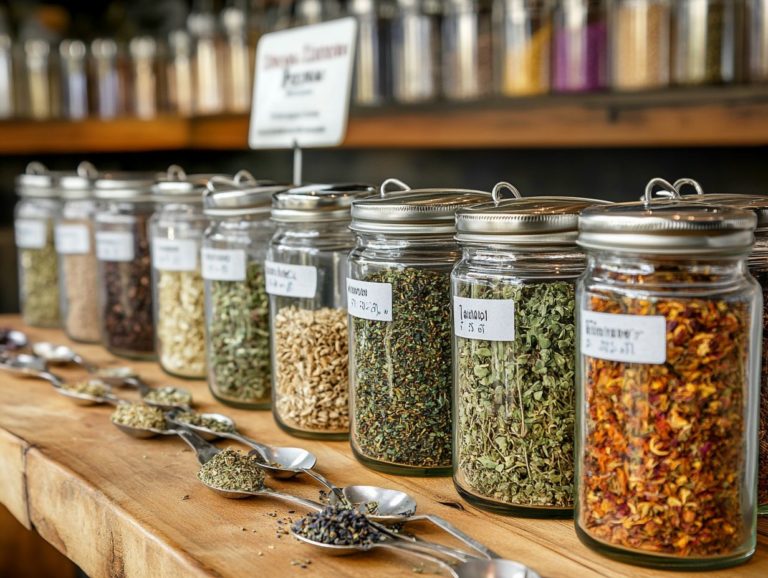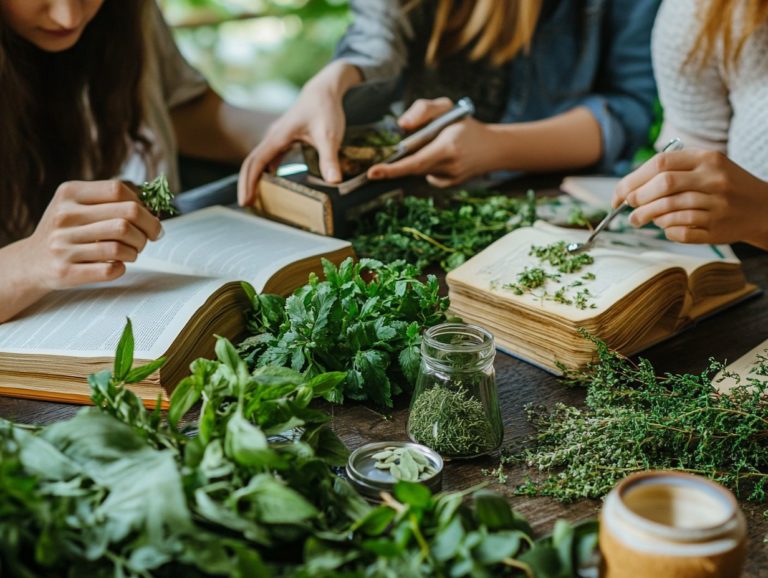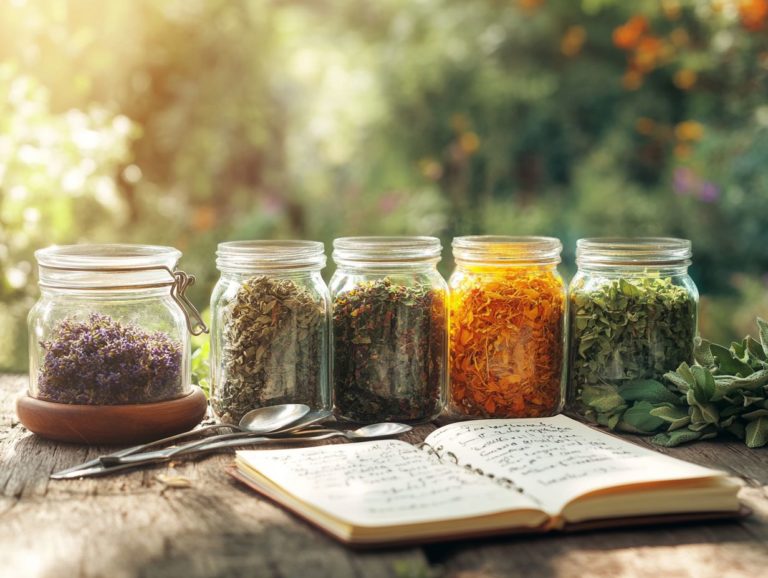5 Safety Measures for Herbal Dosage Practices
As herbal medicine continues to rise in popularity, understanding how to use it safely is more important than ever.
This article outlines five essential safety measures for effective herbal dosage practices, empowering you to make informed choices. Get ready to explore the amazing benefits, forms, and risks associated with herbal medicine, equipping you to integrate it into your health plan with confidence.
Dive in and discover how to navigate this natural healing journey with safety and assurance!
Contents
- Key Takeaways:
- 1. Get Expert Guidance for Safe Herbal Use
- 2. Start with Small Dosages
- 3. Be Aware of Potential Interactions
- 4. Follow Recommended Dosages and Instructions
- 5. Keep Track of Any Side Effects
- What Are the Benefits of Herbal Medicine?
- What Are the Best Practices for Storing Herbal Medicine?
- How Can You Incorporate Herbal Medicine into Your Overall Health Plan?
- What Are the Most Common Myths About Herbal Medicine?
- Frequently Asked Questions
- Curious about safety measures for herbal dosages? Here are five vital tips!
- Why is it important to research and understand the herb before taking it?
- Should I consult with a healthcare professional before taking herbal supplements?
- How can following recommended dosage instructions help ensure safety?
- What are potential interactions and side effects to be aware of when taking herbal supplements?
- How can I store herbs properly to maintain their effectiveness and safety?
Key Takeaways:
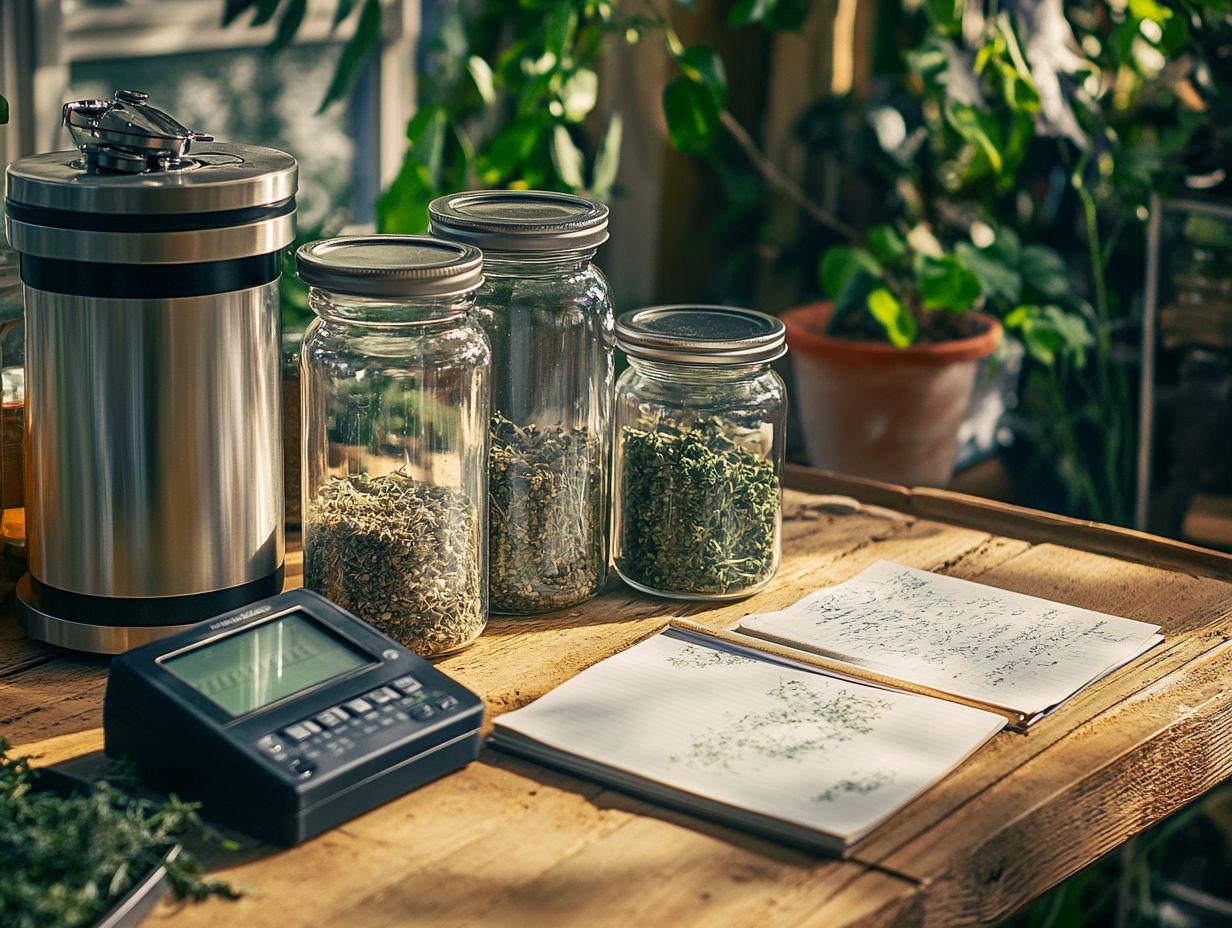
- Consult with a qualified practitioner before trying any herbal medicine to ensure it is safe and appropriate for your individual needs.
- Start with small dosages and gradually increase to recommended levels to minimize potential side effects and reactions.
- Be aware of potential interactions with other medications or health conditions and discuss with your healthcare provider before taking any herbal medicine.
1. Get Expert Guidance for Safe Herbal Use
Consulting with a qualified healthcare provider is crucial before starting any herbal treatment. These professionals can offer invaluable guidance on safe and effective usage tailored specifically to your symptoms and conditions, ensuring a holistic approach to your health management while considering any existing conventional treatments.
Their expertise allows them to assess your specific health conditions, enabling personalized recommendations that align perfectly with your unique needs. A knowledgeable healthcare provider can inform you about which herbal supplements may be beneficial and how to incorporate them safely into your existing treatment plan. This is especially important, as some herbal remedies can interact with prescribed medications, potentially leading to adverse effects.
By taking this important precaution, you can enhance your wellness journey while minimizing risks and maximizing the benefits of natural healing approaches.
2. Start with Small Dosages
When you start a new herbal supplement regimen, it s essential to begin with small dosages. This allows you to gauge your individual tolerance and the product’s effectiveness, reducing the risk of adverse reactions while maximizing potential health benefits.
This thoughtful approach allows your body to adapt gradually, giving you the opportunity to observe how you respond to the herbal product over time. Adjusting your dosages based on your personal response is crucial, as everyone s body chemistry interacts differently with herbs.
Regularly monitoring your health and wellness during this period can help you spot any negative effects while confirming the supplement s benefits. By maintaining an ongoing evaluation, you can fine-tune your intake to ensure optimal safety and effectiveness, all while tailoring it to your unique needs and health goals.
3. Be Aware of Potential Interactions
Being aware of potential interactions between herbal medicine and conventional medications is essential for your safety and for preventing adverse reactions. Certain herbs can influence the metabolism and effectiveness of your prescribed treatments.
Take St. John’s Wort, for example. It’s a popular choice for mild depression, but it has a reputation for interacting with various medications, especially antidepressants, blood thinners, and certain cancer therapies. This can lead to either decreased effectiveness or increased side effects, which isn t ideal.
These interactions underscore the necessity of thorough research into specific herbs and their properties before you consider adding them to your routine. Always consult with your healthcare provider about any herbs you’re thinking of using. This ensures you take a comprehensive approach to your health, considering all aspects of treatment while steering clear of potential complications.
Take charge of your health today!
4. Follow Recommended Dosages and Instructions
Following the recommended dosages and instructions for herbal products is crucial to ensure your safety and effectiveness. Improper use can lead to adverse reactions and diminish the health benefits you seek.
It’s essential for you to familiarize yourself with the various forms of herbal medicine, such as tinctures, extracts, and capsules. Each formulation may have different strengths and how your body absorbs them, which can significantly impact your results. Understanding these distinctions empowers you to make informed choices that align with your personal health goals.
Consulting with healthcare providers before embarking on any herbal regimen can provide valuable insights, ensuring that your selection of remedies complements existing treatments and addresses your specific health concerns.
Following these guidelines helps you take better care of your health.
5. Keep Track of Any Side Effects
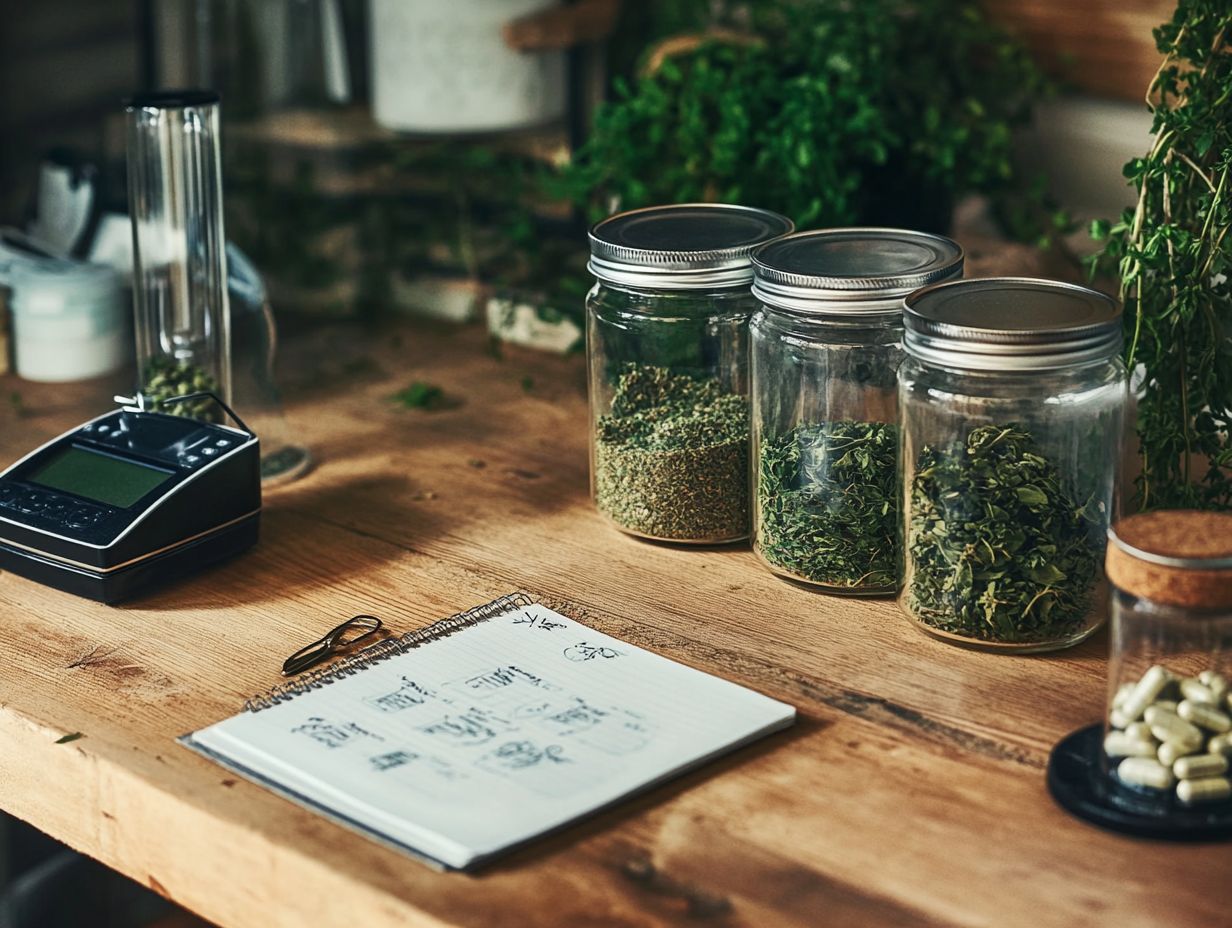
Keeping track of any side effects you experience while using herbal medicine is crucial for monitoring your health and ensuring the supplements aren t causing any unwanted reactions.
By maintaining a health journal, you can create a comprehensive record of your mood changes, energy levels, and any other symptoms that arise during your herbal regimen. This practice not only helps you recognize patterns but also provides valuable insights to share with your healthcare provider, facilitating a more informed discussion about your treatment options.
Documenting these aspects empowers you to make adjustments in your welfare strategy, leading to a more personalized and effective approach in managing your health journey.
What Are the Benefits of Herbal Medicine?
Herbal medicine offers exciting benefits that can transform your health! It provides you with natural treatments for various conditions, enhances your immune system, and promotes overall health through time-tested plant-based remedies that resonate with whole-body health approaches.
Studies show that herbal remedies can effectively help with anxiety, sleep issues, and digestive problems. For example, chamomile is frequently recommended for its soothing effects, helping you achieve restful sleep while alleviating anxiety levels. Similarly, ginger has garnered significant attention for its ability to combat nausea and support digestive health.
Turmeric, renowned for its anti-inflammatory properties, has been shown to assist in managing chronic pain and arthritis symptoms. These findings highlight how integrating herbal medicine into your healthcare routine can provide you with natural alternatives for symptom relief and contribute to your overall well-being.
What Are the Different Forms of Herbal Medicine?
Herbal medicine comes in an array of forms, such as tinctures, capsules, extracts, and teas, each offering distinct benefits and methods of consumption that suit your individual preferences and health needs.
Take tinctures, for example. These concentrated liquid extracts are crafted by soaking herbs in alcohol or glycerin, allowing for swift absorption and ease of use especially beneficial for those who may struggle with swallowing pills. Capsules, in contrast, provide a straightforward way to consume herbs without any taste distractions, making them ideal for those who appreciate simplicity and convenience.
Then there are extracts, which are powerful concentrations often utilized in therapeutic settings. And let’s not overlook teas; they infuse herbs in hot water, creating a gentle remedy that not only aids digestion but also offers a moment of tranquility.
Each form targets various symptoms: tinctures may be particularly effective for acute conditions like anxiety, while teas can soothe digestive troubles. It s crucial to identify which method aligns best with your personal health goals.
What Are the Potential Risks of Herbal Medicine?
While herbal medicine offers a wealth of benefits, it also presents potential risks that demand your attention. Adverse reactions and interactions with conventional medications can occur, highlighting the importance of thorough research and informed usage.
Take garlic, for example often hailed for its cardiovascular perks. However, when paired with medications that prevent blood clots, it can lead to excessive blood thinning, resulting in serious complications. Likewise, echinacea, a popular choice for immune support, may provoke allergic reactions in some people or interfere with medications that weaken the immune system.
Numerous studies, including those published in the *Journal of Herbal Medicine*, stress the necessity of understanding these risks. Such research makes it clear that not all natural remedies are inherently safe. Therefore, it’s essential to consult healthcare professionals and consider the importance of safety in herbal medicine before incorporating them into your health routine.
How Can One Determine the Right Dosage for Herbal Medicine?
Determining the right dosage for herbal medicine requires a thoughtful understanding of your unique health needs. It s crucial to have this conversation with a qualified healthcare provider to ensure both safety and effectiveness. This is especially important when considering herbal supplements that may interact with conventional medications.
This assessment should encompass various personal factors, including your age, weight, and any existing medical conditions you might have. For instance, younger individuals often metabolize substances differently than older adults, and your weight can significantly influence the ideal dosage for optimal benefits. Additionally, consider how your health conditions may affect your response to herbal dosage guidelines for pregnant women and treatments.
Pre-existing medications can interact with herbal treatments, making it essential to discuss these considerations with a professional. Certain herbal remedies, such as St. John’s Wort or garlic, could affect the effectiveness of your prescribed medications. Proper guidance not only helps you pinpoint the most suitable dosage but also enhances the overall success and safety of your herbal regimen. For more information, refer to these safety tips for creating herbal remedies.
What Are the Most Common Herbal Interactions to Be Aware Of?
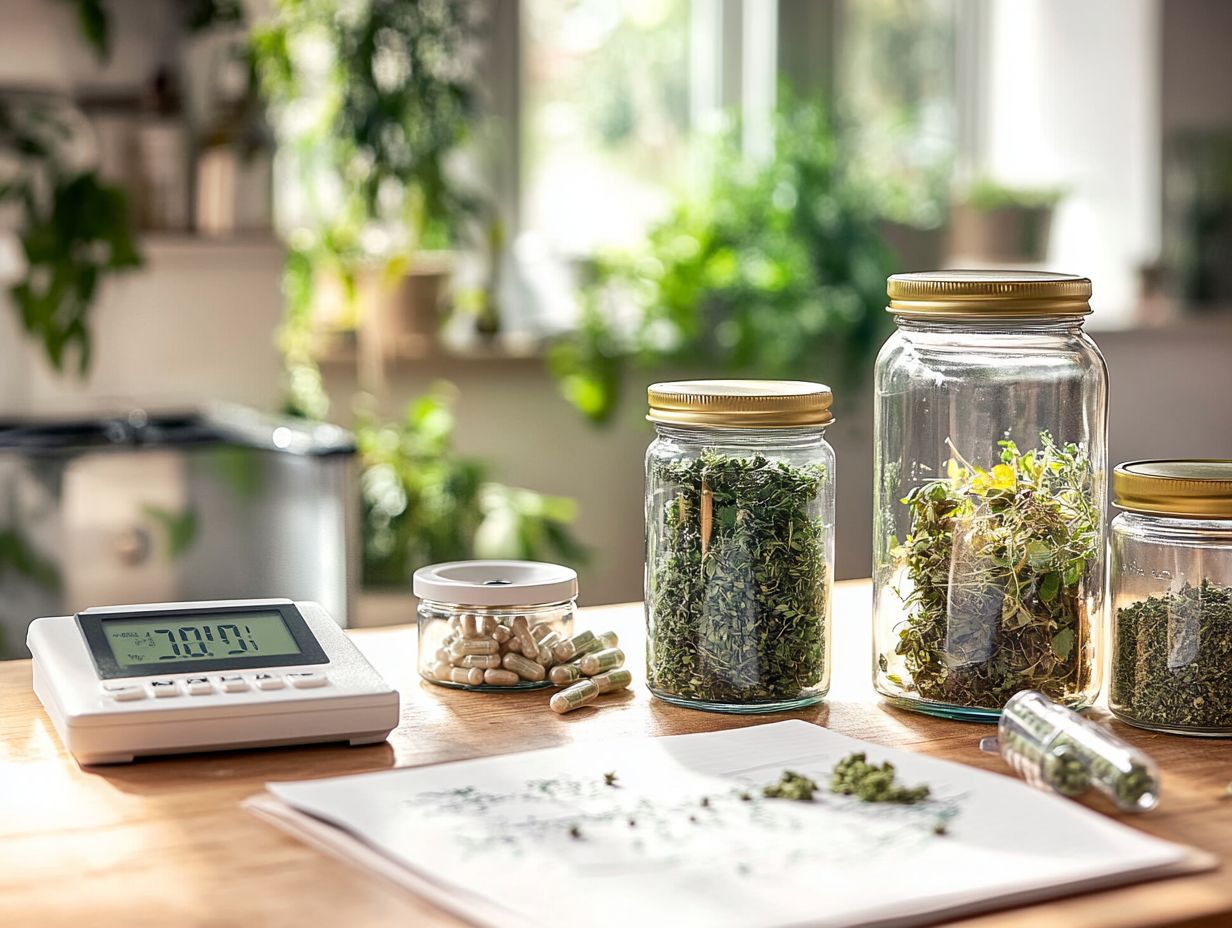
Understanding the most common herbal interactions is essential for your safety. Certain herbs, such as St. John’s Wort, ginkgo, and ginger, can significantly impact the effectiveness of conventional medications. This highlights the importance of understanding potential interactions and symptoms that may arise.
These interactions may lead to unexpected side effects or diminish the therapeutic benefits of your prescribed treatments. For example, a herbal supplement designed to boost blood circulation, like turmeric or ginkgo, might enhance the potency of medications that prevent blood clots, potentially resulting in harmful consequences.
The effects of herbal remedies can differ from person to person, influenced by factors like age, gender, and overall health. Therefore, if you’re considering adding herbal supplements to your wellness routine, such as echinacea or valerian for mood or energy, it’s wise to consult with healthcare professionals. For detailed information, refer to herbal supplements: understanding recommended dosages. This approach ensures that you make informed decisions while prioritizing your well-being.
How Can One Ensure the Quality and Safety of Herbal Medicine?
Ensuring the quality and safety of herbal medicine begins with your careful selection of products from reputable manufacturers that adhere to stringent quality control standards, including FDA guidelines and regulatory guidelines.
Always seek out labels that emphasize third-party testing; this guarantees that an independent organization has validated the product’s purity and potency. Transparency is paramount, so verifying certifications from recognized bodies can offer you additional reassurance about the quality and efficacy of the herbal remedies you consider, including dosage recommendations for popular herbs.
Understanding the source of the ingredients is crucial; herbal products sourced from organic, sustainably cultivated plants typically demonstrate superior quality. This includes various plants known for their health benefits, such as licorice root and milk thistle. Additionally, knowing how to measure herbal dosages accurately can help you make informed choices that prioritize your health and wellness.
What Are the Best Practices for Storing Herbal Medicine?
Proper storage of herbal remedies is crucial for preserving their quality and effectiveness. Improper conditions can lead to degradation and a loss of the beneficial properties you depend on, including flavor and potency.
To maintain the potency of your herbal extracts, keep tinctures in dark glass containers. This simple step protects them from light exposure, which can compromise their integrity over time. Additionally, be mindful of 5 common herbal dosage mistakes that could impact their effectiveness. Capsules thrive in a cool, dry environment, away from humidity and temperature fluctuations that could diminish their contents and lead to adverse reactions.
Paying attention to expiration dates is essential. Using outdated products not only reduces their effectiveness but can pose health risks, especially for those with chronic conditions. To ensure safety, it’s also important to understand herbal safety. By following these storage guidelines, you can significantly enhance both the shelf life and effectiveness of your herbal remedies.
How Can You Incorporate Herbal Medicine into Your Overall Health Plan?
Incorporating herbal medicine into your health plan means aligning herbal supplements with your health goals and any existing treatments. This creates a complete wellness plan that considers both traditional and alternative therapies.
Evaluate how different herbs, such as passionflower for anxiety or turmeric for inflammation, can supercharge your health! Consider your unique lifestyle, dietary preferences, and physical activities when integrating these natural remedies.
Integrating other therapeutic modalities, like yoga or acupuncture, can further optimize your health outcomes. Regular check-ins with your healthcare providers are essential. They can provide insights into safe usage, potential interactions with herbal remedies, and make necessary adjustments to your health plan, promoting a well-rounded and informed approach to your personal well-being.
What Are the Most Common Myths About Herbal Medicine?
Many myths surround herbal medicine, leading to misconceptions about its effectiveness and safety as an alternative or complementary therapy.
While these natural remedies have a rich history across cultures, it’s crucial to distinguish between anecdotal evidence and scientifically validated results. Research from reputable organizations, like the National Center for Complementary and Integrative Health, reveals that not all herbal supplements are created equal. Some may interact negatively with prescribed medications, like ginkgo or garlic, or contain unregulated ingredients.
As you consider these therapies, engage with educational resources, such as those from the American Family Physician or Journal of Patient Experience. Consulting healthcare professionals can empower you with credible information to shape your decisions about incorporating herbal medicine into your health regimen.
Frequently Asked Questions
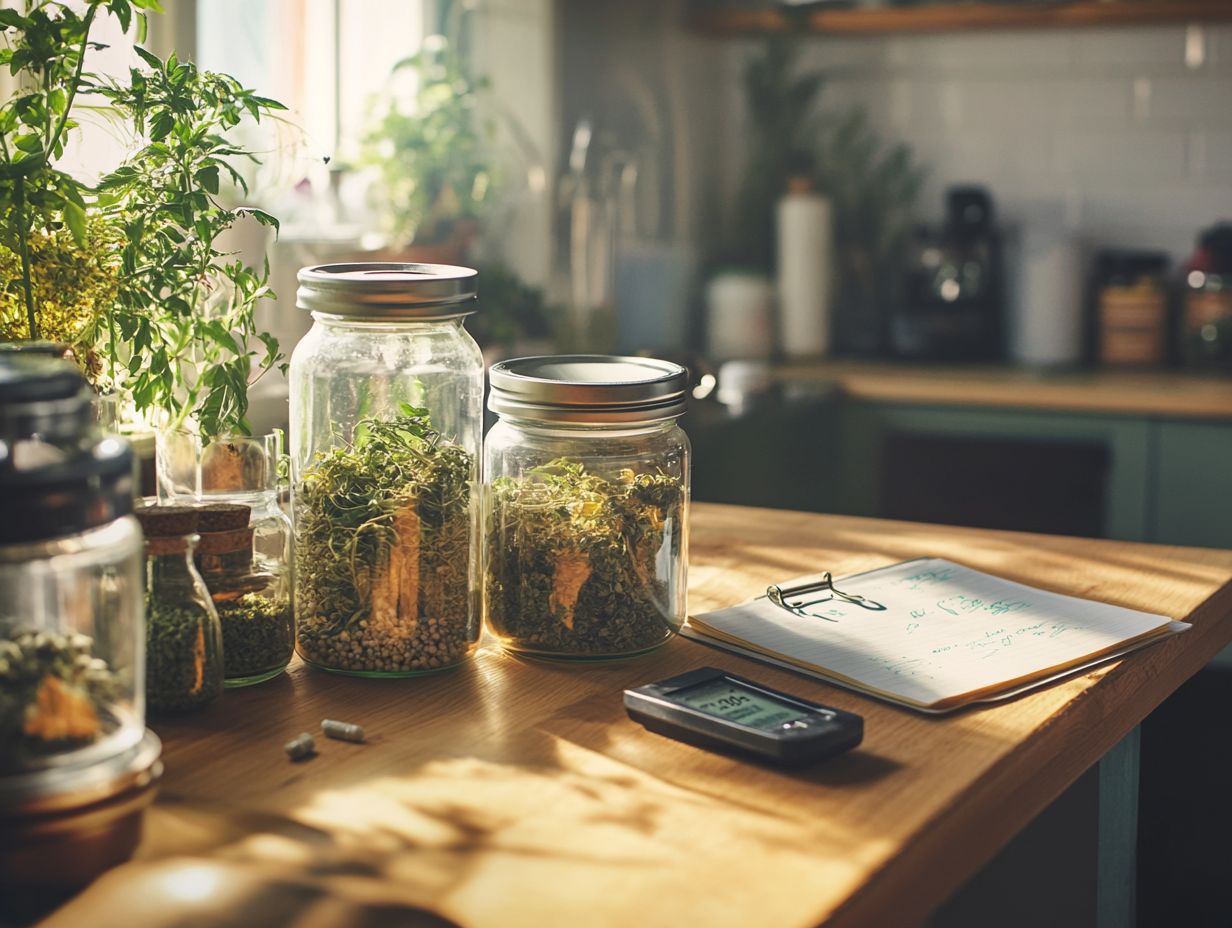
Curious about safety measures for herbal dosages? Here are five vital tips!
- Proper research and understanding of the herb.
- Consulting with a healthcare professional.
- Following recommended dosage instructions.
- Being aware of potential interactions with medications and side effects.
- Storing herbs properly to maintain their quality.
Why is it important to research and understand the herb before taking it?
Researching and understanding the herb ensures safety and effectiveness. Different herbs, such as licorice root for digestive health or valerian for sleep, may have various recommended dosages and potential side effects. Some may not be suitable for certain individuals or medical conditions.
Should I consult with a healthcare professional before taking herbal supplements?
Yes! It is recommended to consult with a healthcare professional before taking herbal supplements. They can provide personalized advice based on your health history, any chronic conditions, and potential interactions with medications you might be taking.
Ready to dive into the world of herbal medicine? Let s get started!
How can following recommended dosage instructions help ensure safety?
Following dosage instructions helps prevent accidental overdoses. This is crucial for potent herbal extracts.
It’s important to follow the manufacturer’s or healthcare professional’s instructions.
What are potential interactions and side effects to be aware of when taking herbal supplements?
Herbal supplements can interact with other medications. This may cause unwanted side effects or reduce the effectiveness of either substance.
Some herbs, like black cohosh or turmeric, can lead to allergic reactions or digestive issues.
How can I store herbs properly to maintain their effectiveness and safety?
Store herbs in a cool, dry place away from direct sunlight. Always check the expiration date and dispose of any expired or damaged herbs responsibly.
Using airtight containers, especially for volatile substances like essential oils, helps maintain freshness.

